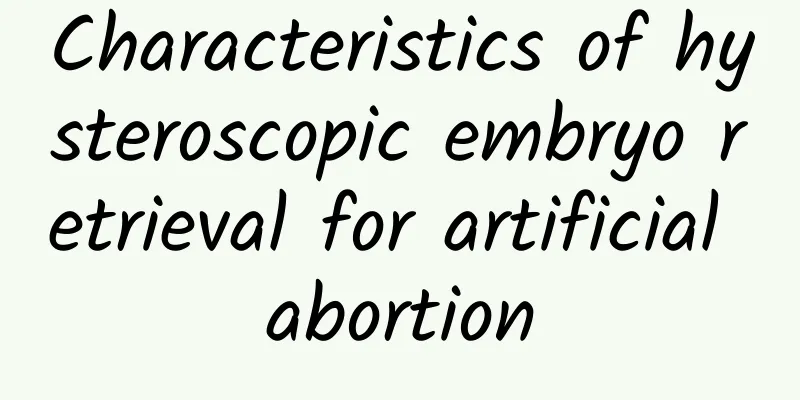Characteristics of hysteroscopic embryo retrieval for artificial abortion

|
Painless abortion has been increasingly used in recent years, and the methods have become more and more sophisticated. It can be divided into many types, including ordinary painless abortion, superconducting visual painless abortion, microtube visual painless abortion, and hysteroscopic embryo retrieval. Among them, hysteroscopic embryo retrieval is a new generation of abortion surgery. It means that under reliable intravenous anesthesia, a hysteroscope is first inserted to explore the uterine cavity to determine the location of the gestational sac, and then a suction tube is inserted to suction the uterus and specifically suck out the decidual tissue in the gestational sac. Finally, a hysteroscopy is performed to ensure that the embryonic tissue is completely removed. This method can replace traditional artificial abortion, medical abortion, and curettage (pregnancy exceeds the abortion time limit), and is especially suitable for patients with early pregnancy, nulliparous patients, and habitual... Abortion. Hysteroscopic embryo retrieval is characterized by direct vision, painlessness, and minimally invasiveness. It integrates treatment and diagnosis, changing "suction" to "retrieval": First, the doctor can clearly see the situation in the patient's uterus during the operation, and can see every step of the operation. In addition to attaching the gestational sac, it does not cause damage to the surrounding tissues; there will be no missed retrieval or embryo residue, and complications such as uterine perforation and intraoperative bleeding can be avoided, improving the safety of the operation. Secondly, while retrieval of the embryo, the cervicoscope can also examine the uterine cavity, detect abnormalities, and treat them. It can also remove tissues that need to be pathologically examined, providing a basis for further diagnosis and treatment of the disease. |
<<: Treatment options for patients with chronic adnexitis
>>: Long-term use of sanitary pads can cause cervical erosion
Recommend
What tests are needed for pelvic peritonitis?
Pelvic peritonitis is a common gynecological dise...
Nutritionist: Pregnant women can avoid urinary tract infections by taking cranberries
According to statistics, 1 in 6 women will have a...
What are the causes of cervical erosion?
If cervical erosion is not treated actively, it c...
Being a couch potato and loving to cross your legs will cause you to suffer from back pain! 3 stretching exercises to protect your lumbar spine
Are you a couch potato who often stays at home wa...
What is an ectopic pregnancy and what causes it?
Ectopic pregnancy refers to the implantation and ...
Four factors may cause acute pelvic inflammatory disease
As a more serious gynecological disease, the trea...
What are the preferred hospitals for treating cervical warts?
Sitting and waiting for death is not an option fo...
How to treat vaginitis
In life, vaginitis has affected the normal life o...
Early sexual intercourse may induce cervical erosion
Early sexual intercourse may induce cervical eros...
What are the causes of dysmenorrhea?
Dysmenorrhea causes great physical harm and pain ...
Can I take Yasmin if I have uterine fibroids?
Yasmin is the trade name of drospirenone ethinyl ...
Why do women develop uterine fibroids? What can I eat to eliminate uterine fibroids the fastest?
Why do women develop uterine fibroids? Uterine fi...
What medicine is effective for uterine fluid accumulation after induced labor
Uterine effusion causes great distress to women, ...
Prevention measures for endometrial tuberculosis
The uterus of a woman is where her baby lives. On...
Should I choose partial or full anesthesia for abortion? This article will tell you
Abortion surgery, whether it is partial anesthesi...









